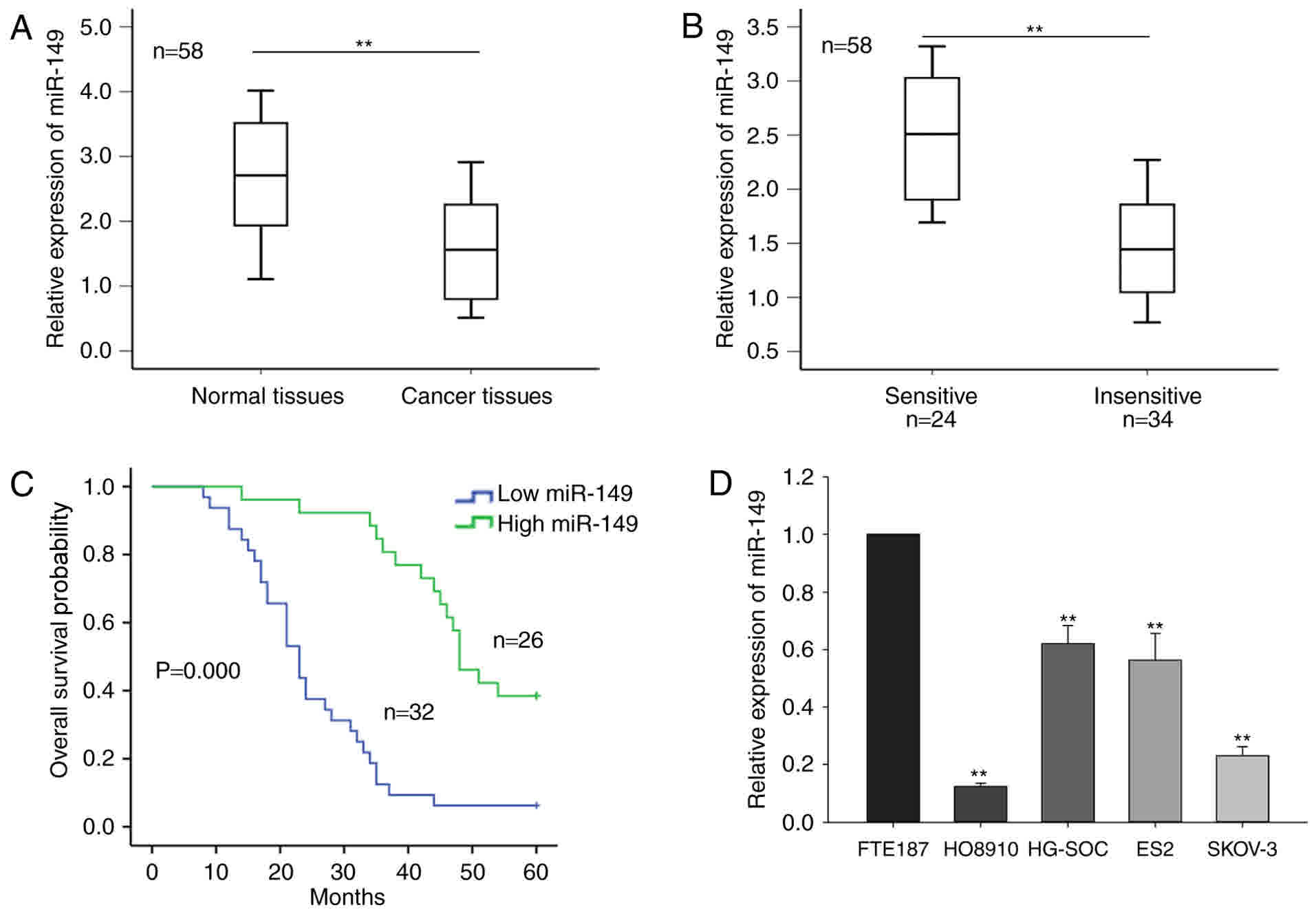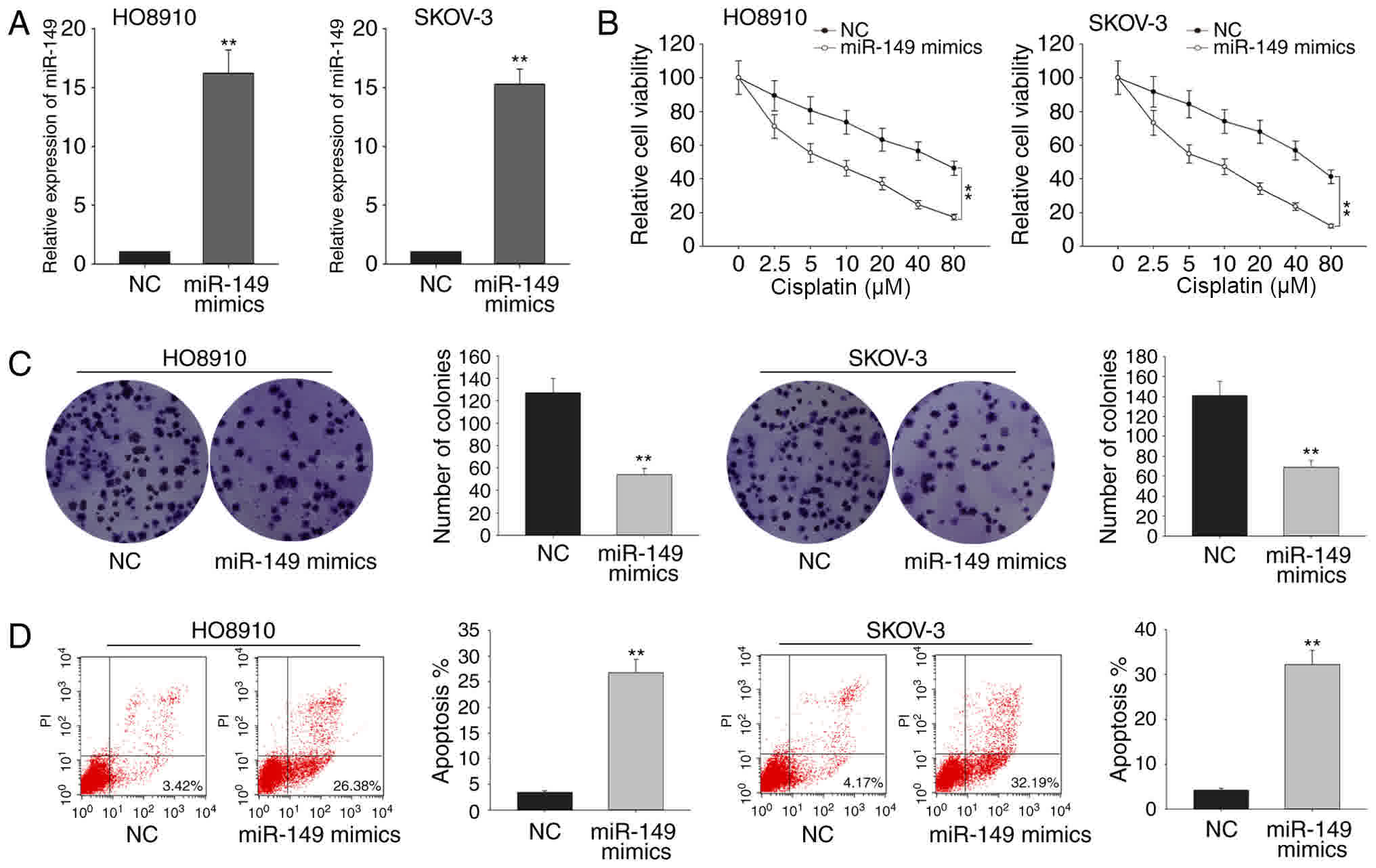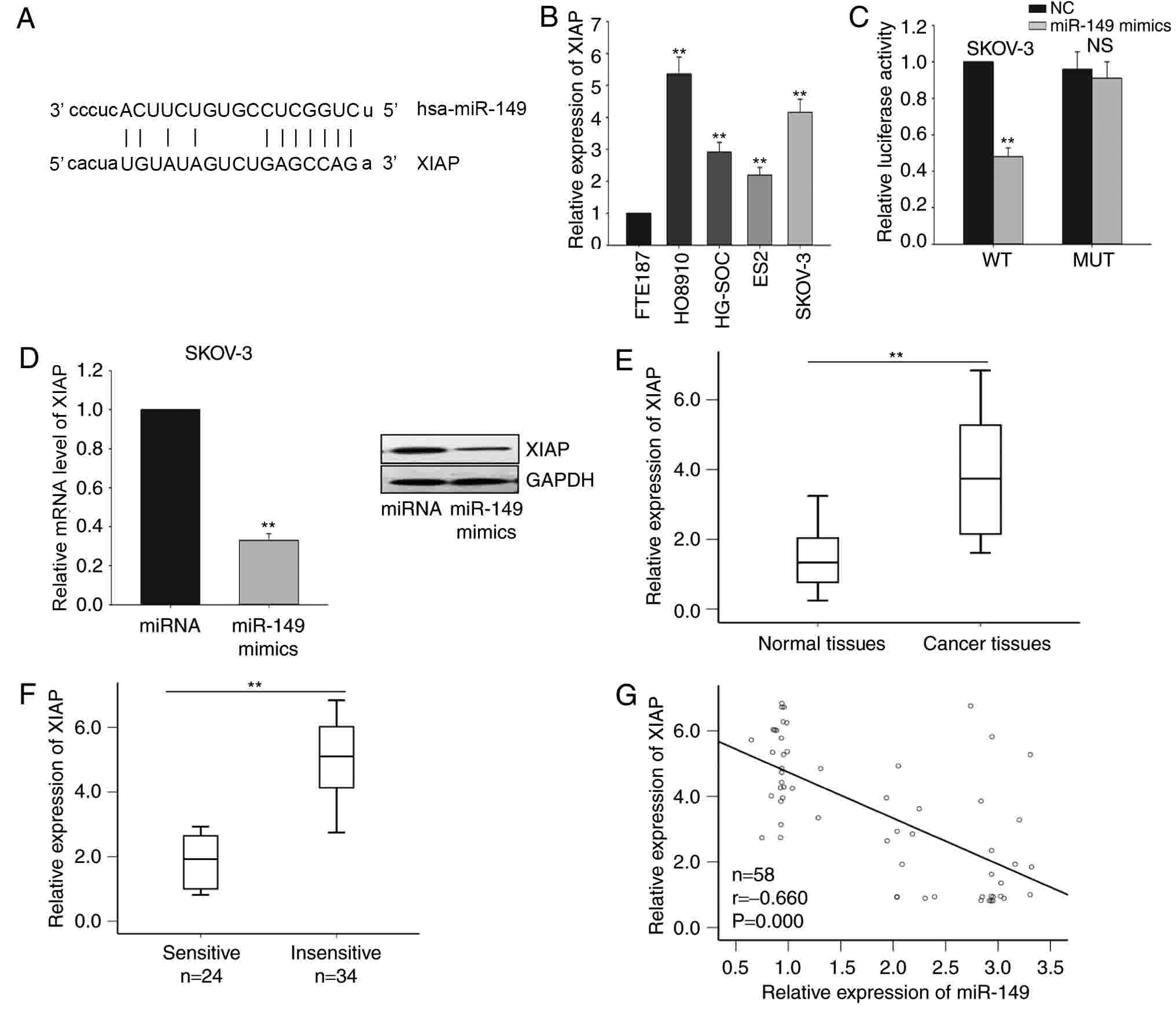|
1
|
Torre LA, Bray F, Siegel RL, Ferlay J,
Lortet-Tieulent J and Jemal A: Global cancer statistics, 2012. CA
Cancer J Clin. 65:87–108. 2015. View Article : Google Scholar : PubMed/NCBI
|
|
2
|
Tian S, Zhang M, Chen X, Liu Y and Lou G:
MicroRNA-595 sensitizes ovarian cancer cells to cisplatin by
targeting ABCB1. Oncotarget. 7:87091–87099. 2016. View Article : Google Scholar : PubMed/NCBI
|
|
3
|
Flavin R, Smyth P, Barrett C, Russell S,
Wen H, Wei J, Laios A, O'Toole S, Ring M, Denning K, et al: miR-29b
expression is associated with disease-free survival in patients
with ovarian serous carcinoma. Int J Gynecol Cancer. 19:641–647.
2009. View Article : Google Scholar : PubMed/NCBI
|
|
4
|
Bartel DP: MicroRNAs: Genomics,
biogenesis, mechanism, and function. Cell. 116:281–297. 2004.
View Article : Google Scholar : PubMed/NCBI
|
|
5
|
Miao Y, Zhang LF, Guo R, Liang S, Zhang M,
Shi S, Shang-Guan CF, Liu MF and Li B: (18)F-FDG PET/CT for
monitoring the response of breast cancer to miR-143-based
therapeutics by targeting tumor glycolysis. Mol Ther Nucleic Acids.
5:e3572016. View Article : Google Scholar : PubMed/NCBI
|
|
6
|
Cai M, Wang Z, Zhang J, Zhou H, Jin L, Bai
R and Weng Y: Adam17, a Target of Mir-326, Promotes Emt-Induced
Cells Invasion in Lung Adenocarcinoma. Cell Physiol Biochem.
36:1175–1185. 2015. View Article : Google Scholar : PubMed/NCBI
|
|
7
|
Perry MM, Baker JE, Gibeon DS, Adcock IM
and Chung KF: Airway smooth muscle hyperproliferation is regulated
by microRNA-221 in severe asthma. Am J Respir Cell Mol Biol.
50:7–17. 2014.PubMed/NCBI
|
|
8
|
O'Leary L, Sevinc K, Papazoglou IM, Tildy
B, Detillieux K, Halayko AJ, Chung KF and Perry MM: Airway smooth
muscle inflammation is regulated by microRNA-145 in COPD. FEBS
Lett. 590:1324–1334. 2016. View Article : Google Scholar : PubMed/NCBI
|
|
9
|
Baldwin S, Deighan C, Bandeira E, Kwak KJ,
Rahman M, Nana-Sinkam P, Lee LJ and Paulaitis ME: Analyzing the
miRNA content of extracellular vesicles by fluorescence
nanoparticle tracking. Nanomedicine. 13:765–770. 2017. View Article : Google Scholar : PubMed/NCBI
|
|
10
|
Goeppert B, Ernst C, Baer C, Roessler S,
Renner M, Mehrabi A, Hafezi M, Pathil A, Warth A, Stenzinger A, et
al: Cadherin-6 is a putative tumor suppressor and target of
epigenetically dysregulated miR-429 in cholangiocarcinoma.
Epigenetics. 11:780–790. 2016. View Article : Google Scholar : PubMed/NCBI
|
|
11
|
Xi S, Inchauste S, Guo H, Shan J, Xiao Z,
Xu H, Miettenen M, Zhang MR, Hong JA, Raiji MT, et al: Cigarette
smoke mediates epigenetic repression of miR-217 during esophageal
adenocarcinogenesis. Oncogene. 34:5548–5559. 2015. View Article : Google Scholar : PubMed/NCBI
|
|
12
|
Chen Y, Zhao J, Luo Y, Wang Y and Jiang Y:
Downregulated expression of miRNA-149 promotes apoptosis in side
population cells sorted from the TSU prostate cancer cell line.
Oncol Rep. 36:2587–2600. 2016. View Article : Google Scholar : PubMed/NCBI
|
|
13
|
Cao D, Jia Z, You L, Wu Y, Hou Z, Suo Y,
Zhang H, Wen S, Tsukamoto T, Oshima M, et al: 18β-glycyrrhetinic
acid suppresses gastric cancer by activation of miR-149-3p-Wnt-1
signaling. Oncotarget. 7:71960–71973. 2016. View Article : Google Scholar : PubMed/NCBI
|
|
14
|
Assem H, Rambau PF, Lee S, Ogilvie T,
Sienko A, Kelemen LE and Köbel M: High-grade endometrioid carcinoma
of the ovary: A clinicopathologic study of 30 cases. Am J Surg
Pathol. Jan 5–2018.(Epub ahead of print). View Article : Google Scholar : PubMed/NCBI
|
|
15
|
Guenther LM, Rowe RG, Acharya PT, Swenson
DW, Meyer SC, Clinton CM, Guo D, Sridharan M, London WB, Grier HE,
et al: Response evaluation criteria in solid tumors (RECIST)
following neoadjuvant chemotherapy in osteosarcoma. Pediatr Blood
Cancer. Dec 18–2017.(Epub ahead of print). PubMed/NCBI
|
|
16
|
Livak KJ and Schmittgen TD: Analysis of
relative gene expression data using real-time quantitative PCR and
the 2(-Delta Delta C(T)) method. Methods. 25:402–408. 2001.
View Article : Google Scholar : PubMed/NCBI
|
|
17
|
Wang H, Sun M, Guo J, Ma L, Jiang H, Gu L,
Wen H, Liao S, Chen J, Zeng B, et al: 3-O-(Z)-coumaroyloleanolic
acid overcomes Cks1b-induced chemoresistance in lung cancer by
inhibiting Hsp90 and MEK pathways. Biochem Pharmacol. 135:35–49.
2017. View Article : Google Scholar : PubMed/NCBI
|
|
18
|
Pan CW, Jin X, Zhao Y, Pan Y, Yang J,
Karnes RJ, Zhang J, Wang L and Huang H: AKT-phosphorylated FOXO1
suppresses ERK activation and chemoresistance by disrupting
IQGAP1-MAPK interaction. EMBO J. 36:995–1010. 2017. View Article : Google Scholar : PubMed/NCBI
|
|
19
|
Ma H, Yokoyama S, Saiki I and Hayakawa Y:
Chemosensitizing effect of saikosaponin B on B16F10 melanoma cells.
Nutr Cancer. 69:505–511. 2017. View Article : Google Scholar : PubMed/NCBI
|
|
20
|
D'Angelo D, Mussnich P, Arra C, Battista S
and Fusco A: Critical role of HMGA proteins in cancer cell
chemoresistance. J Mol Med (Berl). 95:353–360. 2017. View Article : Google Scholar : PubMed/NCBI
|
|
21
|
Chen S, Huang J, Liu Z, Liang Q, Zhang N
and Jin Y: FAM83A is amplified and promotes cancer stem cell-like
traits and chemoresistance in pancreatic cancer. Oncogenesis.
6:e3002017. View Article : Google Scholar : PubMed/NCBI
|
|
22
|
Pu Y, Zhao F, Wang H and Cai S: MiR-34a-5p
promotes multi-chemoresistance of osteosarcoma through
down-regulation of the DLL1 gene. Sci Rep. 7:442182017. View Article : Google Scholar : PubMed/NCBI
|
|
23
|
Liu Y, Zhang B, Shi T and Qin H: miR-182
promotes tumor growth and increases chemoresistance of human
anaplastic thyroid cancer by targeting tripartite motif 8. Onco
Targets Ther. 10:1115–1122. 2017. View Article : Google Scholar : PubMed/NCBI
|
|
24
|
Jin L, Li Y, Liu J, Yang S, Gui Y, Mao X,
Nie G and Lai Y: Tumor suppressor miR-149-5p is associated with
cellular migration, proliferation and apoptosis in renal cell
carcinoma. Mol Med Rep. 13:5386–5392. 2016. View Article : Google Scholar : PubMed/NCBI
|
|
25
|
Fan SJ, Li HB, Cui G, Kong XL, Sun LL,
Zhao YQ, Li YH and Zhou J: miRNA-149* promotes cell proliferation
and suppresses apoptosis by mediating JunB in T-cell acute
lymphoblastic leukemia. Leuk Res. 41:62–70. 2016. View Article : Google Scholar : PubMed/NCBI
|
|
26
|
Luo G, Chao YL, Tang B, Li BS, Xiao YF,
Xie R, Wang SM, Wu YY, Dong H, Liu XD and Yang SM: miR-149
represses metastasis of hepatocellular carcinoma by targeting
actin-regulatory proteins PPM1F. Oncotarget. 6:37808–37823. 2015.
View Article : Google Scholar : PubMed/NCBI
|
|
27
|
Riley A, Jordan LE and Holcik M: Distinct
5′ UTRs regulate XIAP expression under normal growth conditions and
during cellular stress. Nucleic Acids Res. 38:4665–4674. 2010.
View Article : Google Scholar : PubMed/NCBI
|
|
28
|
Deveraux QL, Takahashi R, Salvesen GS and
Reed JC: X-linked IAP is a direct inhibitor of cell-death
proteases. Nature. 388:300–304. 1997. View
Article : Google Scholar : PubMed/NCBI
|
|
29
|
Tamm I, Kornblau SM, Segall H, Krajewski
S, Welsh K, Kitada S, Scudiero DA, Tudor G, Qui YH, Monks A, et al:
Expression and prognostic significance of IAP-family genes in human
cancers and myeloid leukemias. Clin Cancer Res. 6:1796–1803.
2000.PubMed/NCBI
|
|
30
|
Pardo OE, Lesay A, Arcaro A, Lopes R, Ng
BL, Warne PH, McNeish IA, Tetley TD, Lemoine NR, Mehmet H, et al:
Fibroblast growth factor 2-mediated translational control of IAPs
blocks mitochondrial release of Smac/DIABLO and apoptosis in small
cell lung cancer cells. Mol Cell Biol. 23:7600–7610. 2003.
View Article : Google Scholar : PubMed/NCBI
|
|
31
|
Ding WB, Wang YX and Dong CW: microRNA15b
induced SMCC7721 apoptosis via down-regulation of XIAP. Eur Rev Med
Pharmacol Sci. 21:542–548. 2017.PubMed/NCBI
|
|
32
|
Li X, Chen W, Zeng W, Wan C, Duan S and
Jiang S: microRNA-137 promotes apoptosis in ovarian cancer cells
via the regulation of XIAP. Br J Cancer. 116:66–76. 2017.
View Article : Google Scholar : PubMed/NCBI
|
|
33
|
Han J, Liu Z, Wang N and Pan W:
MicroRNA-874 inhibits growth, induces apoptosis and reverses
chemoresistance in colorectal cancer by targeting X-linked
inhibitor of apoptosis protein. Oncol Rep. 36:542–550. 2016.
View Article : Google Scholar : PubMed/NCBI
|
|
34
|
Wu Q, Yan H, Tao SQ, Wang XN, Mou L, Chen
P, Cheng XW, Wu WY and Wu ZS: XIAP 3′-untranslated region as a
ceRNA promotes FSCN1 function in inducing the progression of breast
cancer by binding endogenous miR-29a-5p. Oncotarget. 8:16784–16800.
2017.PubMed/NCBI
|


















